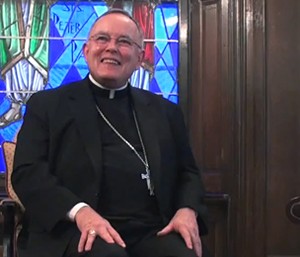The Newsworks
September 7, 2011
http://www.newsworks.org/index.php/homepage-feature/item/26144-philadelphias-new-archbishop-seeks-forgiveness-from-abuse-victims&Itemid=1
[with audio]
 |
| WHYY's Elizabeth Fiedler sat down with incoming Archbishop Charles Chaput to discuss his new role as spiritual leader of the Archdiocese of Philadelphia. (Kimberly Paynter/For NewsWorks) |
Area Catholics will get a new spiritual leader Thursday.
At a 2 p.m. Mass, Cardinal Justin Rigali will welcome Archbishop Charles Chaput to the Archdiocese of Philadelphia.
WHYY's Elizabeth Fiedler spoke with Chaput about a February Philadelphia grand jury report's sexual abuse allegations against clergy and how he's preparing to take the reins in Philadelphia.
FIEDLER: What has it been like since you came to Philadelphia? Has it been what you expected?
CHAPUT: I was welcomed at the airport by Cardinal Rigali and some of the priests, and we went to his house and had dinner together. I unpacked and we said some prayers, and then I went to bed. So it's been, you know, just a time of getting acquainted.
FIEDLER: I've talked to some Philadelphia Catholics—lifelong Catholics, lifelong Philadelphians—who have said what they read in the grand jury report really didn't shake their faith in God, but it did shake their faith in the system. What is your message to those people as they try to move forward?
CHAPUT: Well, you know, it made me sick to my stomach when I read them. It was so sad, the stories that were told there, and I certainly understand why people would be scandalized. You know "'scandalized" comes from a Greek word, "scandalon," which means a stumbling block. And I think what happened causes Catholics to stumble and it's really deeply painful. So I say to them, I understand what they're going through and I'm scandalized by what I read too. But I have great confidence that God will see us through this. So I think we need to speak to one another, pray about things and have confidence that we'll work our way through it.
FIEDLER: What should happen if there are accusations made against priests?
CHAPUT: Well, you know, I think the church has done a pretty good job of having policies. We just have to make sure they're followed through. If priests are accused, we'll take the accusations seriously. If it's a credible accusation, which means that it could have happened—it doesn't mean that it looks like it happened, but it could have happened—the church has the policy of putting people on administrative leave. So I think it's really important for people to understand that if a priest is put on administrative leave, it doesn't mean we at the church think he's guilty. But it's just what we do. If there's an accusation of sexual abuse, it's going to be reported to the police immediately and they'll do their own investigation, which is objective and distinct from the church, and that's very, very good.
FIEDLER: There are certainly survivors of abuse by clergy out there. What is your message to them?
CHAPUT: I would certainly want to ask their forgiveness. And ask them to understand that even though this happened, the church loves them and we hope the distance that's been caused by these events will somehow be overcome. And that they will know that they're loved and welcomed by the church. They're still members of our community even though they've been hurt very badly. So the message would be, we love you. And even though you've been hurt, we hope that you'll feel that you can love us and forgive us for what's happened. And we'll do the best we can to move toward healing in every individual case.
FIEDLER: Do you think the Philadelphia archdiocese made mistakes in how it dealt with these accusations?
CHAPUT: I am not in a position to make that judgment yet. You know I have read the grand jury reports, but I also would like to hear from others that were involved in how they would evaluate the reports.
FIEDLER: As you prepared for the big day? What are you doing to get ready for that? What are your thoughts?
CHAPUT: Well, you know, it's kind of interesting. I've finished my homily, which is the sermon during that day—and that's always something that you're anxious about, writing that. And so what I intend to do between now and then is get enough sleep so I'm not exhausted that day. And to have enough time in my life to pray and reflect so that it isn't just something that's being rushed through. So that I can really, deeply appreciate the grace of the moment and embrace my new responsibilities responsibly and with joy.
FIEDLER: I've read that you're fairly outspoken and not afraid to take a stance even on controversial issues. What sort of archbishop do you hope to be?
CHAPUT: Well, you know, that word "outspoken." I'm always curious about that. People ask me a question and I give them an answer and they say, "Oh, you're outspoken." I don't know. I guess being outspoken means you give answers to people's questions without being evasive. And that's what I hope to do. That's not the only thing a bishop does, of course. We're supposed to be proactively preaching the Gospel of Jesus Christ, and I hope more than anything else that's the kind of bishop I'll be. To do it in a way that's creative and new, but at the same time faithful to the tradition of the church and the word of the Gospel.
Any original material on these pages is copyright © BishopAccountability.org 2004. Reproduce freely with attribution.